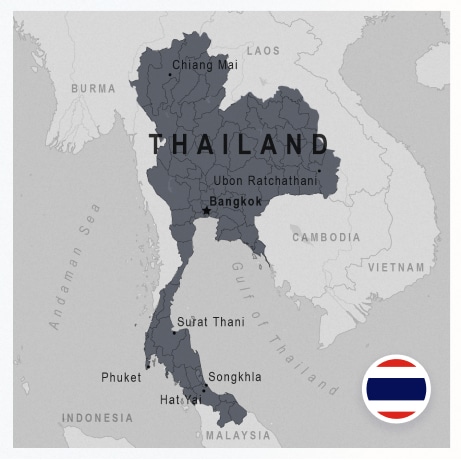Market Spotlight: Thailand



-
Thailand is favorably ranked 21st (of 190) on the World Bank’s Ease of Business Assessment, as compared with Singapore (2nd) and Vietnam (70th).
-
Though international intellectual property standards are generally abided by in Thailand, as a member of the WTO, counterfeit and pirated goods are still a concern for foreign companies.
-
When first entering Thailand, partnering with a local agent is recommended. Local partners can facilitate introductions with government officials, distributors, and provide broad market intelligence.

-
Thailand ranks 100th out of 112 countries globally on the EF English Proficiency Index, reflecting a very poor proficiency in English.
-
According to the UN Human Development Program, the average years of schooling in Thailand is 7.6, significantly less than a majority of their Asian neighbors, and English is rarely taught in the classroom.
-
Even in densely populated regions in Thailand, it is uncommon to find a fluent English speaker, so working through an interpreter is essential.

-
Thailand’s labor costs remain relatively low according to Trading Economics, with a labor cost score of 99 in 2022, compared to Singapore (107) and South Korea (126).
-
Although labor force participation has dropped 6% since 2005, unemployment has not risen above 2.5% reflecting a high level of workforce participation among their population of nearly 70 million people.
-
One factor that may rapidly narrow the Thai workforce is its large aging population. According to the World Bank, those 65 and older will double by 2060. To manage a possible labor shortage, Thailand has embraced migrant workers from across Southeast Asia, with nearly 3 million migrant workers registered at the end of 2019.

-
Thailand’s GDP stood at $506 billion at the end of 2021, making it the 8th largest economy in Asia.
-
The Eastern Economic Corridor in Thailand, an area made up of three Thai provinces, has played a large part in attracting foreign business. Companies expanding here may take advantage of incentives including corporate and import tax exemptions.
-
Despite a contraction between 2019 and 2020, Thailand’s GDP has seen steady growth in the past few decades and is expected to reach pre-pandemic levels by the end of 2022.
-
The agriculture sector employs around ⅓ of Thailand’s workforce. While there has been a decline over the past few decades, agirucltural exports have increased over the past few years and are expected to continue.

-
Being punctual is important in Thai business culture. Formal attire is expected; the way you dress displays your professional status.
-
Small talk is strongly encouraged before meetings. Thai business partners value relationships; you may be perceived as rude by directly speaking about business. It may take a few meetings to make considerable progress on negotiations.
-
‘Sanuk’ is a Thai phrase which means finding joy in what you do. When used in a business setting, Sanuk emphasizes making work something that is enjoyable and meaningful. Although Thai business culture adheres to common rules and formalities, it does not make a distinction between work life and social life.
-
Especially during the first meeting with a Thai business partner, gift exchanges are common. Avoid expensive gifts, as they may be perceived as offensive or a form of bribery.

-
The Thai government strategically established free trade agreements with fellow members in the Association of Southeast Asian Nations (ASEAN), among other Asian and South American countries. Through these agreements, Thailand has granted preferential import duties along with other forms of compensation to incentivize trade.
-
Despite such a high ease of doing business score, Thailand has significant import tariffs for selected goods (Motor Vehicles 80%, Distilled Spirits 55-60%, Plastics 30%). Be mindful of what you may be able to produce in Thailand to avoid added expenses.
-
Foreign countries who manufacture low-cost goods may find it challenging to operate in Thai markets.


